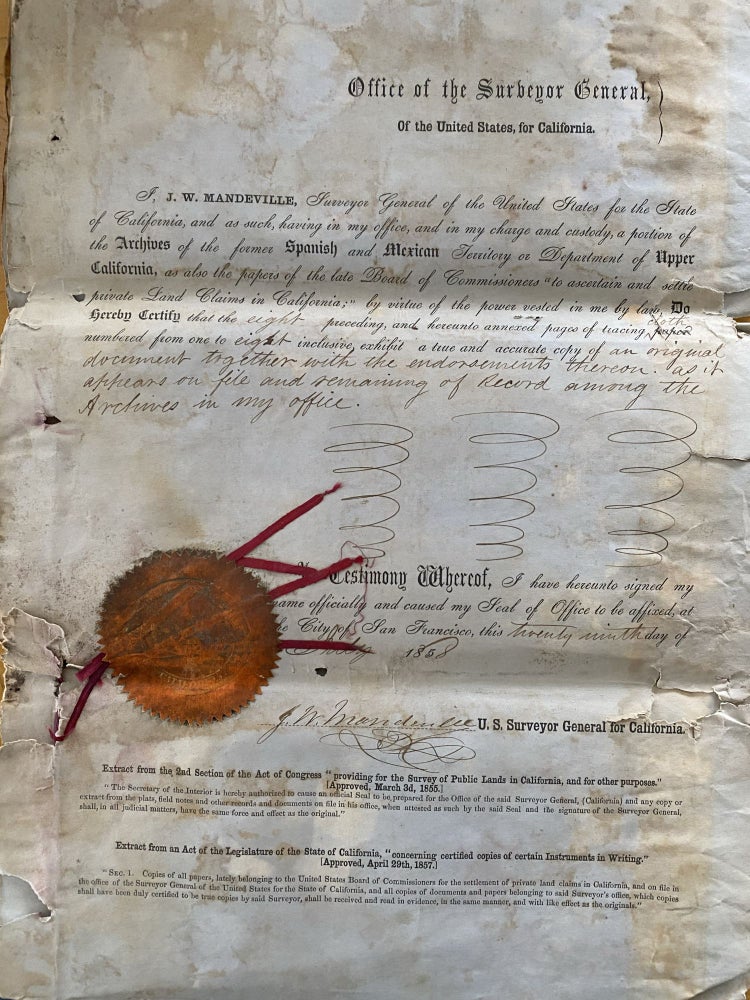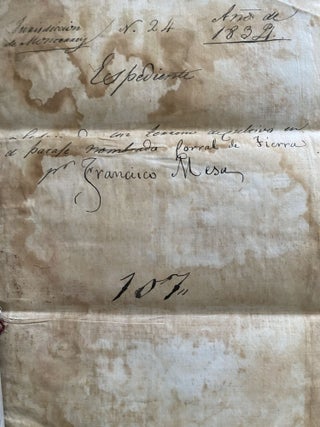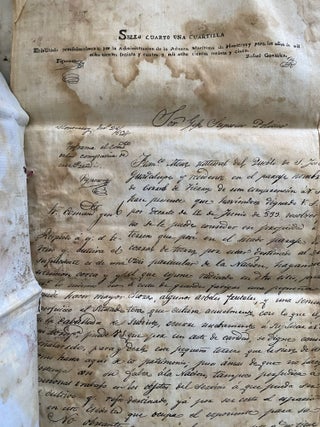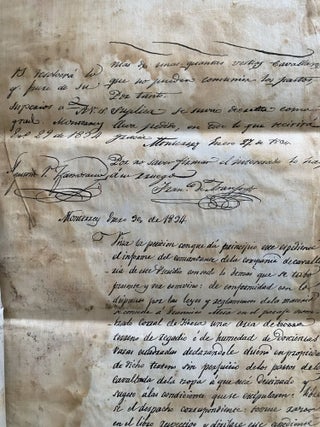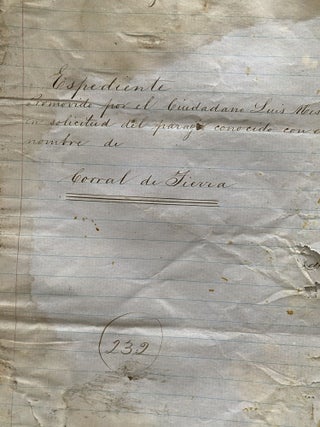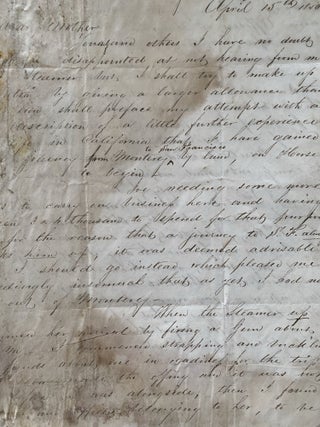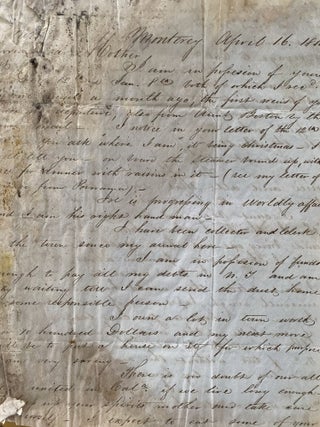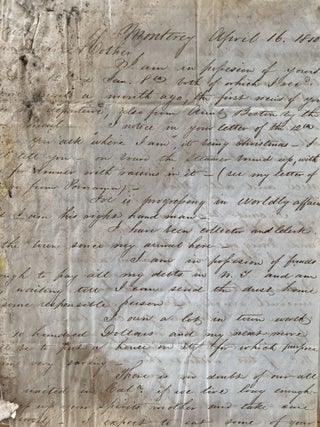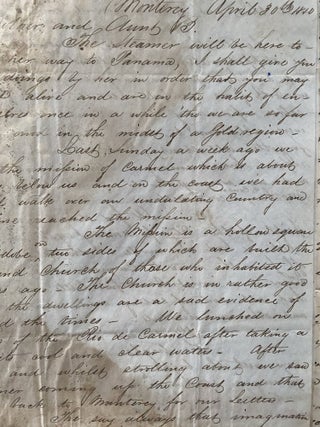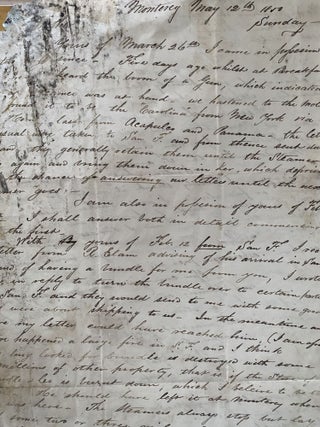Gold-Rush-era Archive of Surveyor Edward Williams, including Thirteen Letters Written from Monterey in 1850, a Transcribed Copy of a Mexican Land Grant from 1834, and Notes Relating to his Work as a Surveyor.
California: 1850s. With thirteen letters, most multi-page, written from Monterey in 1850, a 7 pp facsimile transcription of a 1834 Mexican land grant on cloth measuring 11 x 14 inches, and and eleven page document on paper in Spanish relating to a Monterey land grant, transcribing an 1841 document. Letters heavily worn with some loss at margins but mostly legible, land grant in good to very good condition, transcribed document in Spanish in fair condition with water damage to margins. Fair. Item #List1929
An interesting archive of 1850s-era material relating to the life and career of the surveyor Edward Williams, which recently surfaced in the central mother lode region. The group includes his personal letters from the California Gold Rush, as well as well two interesting documents form his work for the Surveyor General J.W. Mandeville in 1858, where he transcribed two Mexican land grants.
Lt. Edward Williams was a member of Company E, New York Volunteers under Capt. Nelson Taylor. He came to California around 1847 and found employment as a deputy surveyor, later working for the Office of the Surveyor General of the Unites States for California. In 1858, Surveyor General J.W. Mandeville commissioned a report on Mexican-era California Land Grants. Mandeville had Williams copy the original documents exactly - inclusive of an ink copy on linen that is an "exact tracing" of the original documents, starting with 1834 up through about 1840. These "copies" were submitted to the Surveyor General in 1858 for use in the report. Williams continued the title work by copying other documents from about 1841, though this time not as a tracing, but hand copied on the usual blue paper of the 1850s.
The documents illustrate the length officials went to while they investigated Mexican Land Grant titles to California properties in the 1850s. The process was difficult, and involved two distinctly separate cultures and legal systems that clearly conflicted. The Mexican Government granted rights for these large land parcels in California to various people, but clearly stated they could not sell parts of the property. The wording was used many times in litigation of the period in both defense of the land grants, and in opposition to how the land grants were handled. The issues were actually quite simple, in that the Mexican legal standards for land grants was far different from those in the United States, and the two differing forms of written land ownership (and use) clashed.
These documents reflect a parcel of land granted to Francisco Mesa at "Corral de Tierra," a large parcel in Monterrey County, California. Mesa had requested land for "his personal use and that of his family." In the Grant, the title papers reflect "while the land is under (Francisco's) possession it cannot be divided, mortgaged, or a levy placed on it, nor handed down..." These original documents help illustrate the complex story of Mexican Land Grants in California.
Also included are thirteen letters from Ed (aka "Ned") to various family members, primarily his mother and sister Alice, and vice versa. About half are from Ed, the other half are written to him. The dates of the letters are; 1850: February 10th, April 15th, April 16th, April 28th, June 10th, July 30th, October 11th, and November 17th, and 1851: September 9th. One undated letter with heavy loss is written from Panama. The letters are generally readable, but the condition far from perfect, with water stains throughout and chips abundant along edges, and significant textual loss. The letters are generally at least two pages, sometimes four or more, inclusive of writing in the crossed line custom to save paper. Most are datelined at Monterrey, where he discusses the people, the customs, setting and more.
Despite the condition flaws, there is much to be gleaned from his correspondence. In his April 15, 1850 letter . he describes his trip to San Juan (Bautista) from Monterrey in detail while he was on his way to San Francisco. Williams writes of his great pleasure on tasting cooked beef by the Indians that he found was the best he ever tasted as they camped on the way to San Jose, with the ultimate goal, Mission Dolores in San Francisco: “this [the beef] they put on the embers of the fire and broiled it - I never tasted anything like it before, so tender, so juicy…” One of his first notes on San Francisco: "There are regular streets filled with all kinds of sorts of stores… The shipping covers the water as far as you can see. And those nearest the shore are converted into store houses, the rigging being taken down and the and holes cut in the sides for doors...The best houses in town are occupied by gamblers ... a large saloon filled with tables on which are played all kinds of games of chance - at some of the tables are displayed immense amounts of coin and gold in lumps worth from 1 to 5000 dollars which some poor infatuated fool of a miner has at some time lost to them."
In his letter of April 16th, he discusses both his difficulties with women in California and his lack of fitting in back east: “The Spanish Girls are very nice and all that sort of thing but the trouble is to find one that is educated. I can’t bear an uneducated wom an and I think I shall have to come to N.Y. and bring one out here… I know one or two in N.Y. but I don’t believe they would have such an uncouth specimen of an ‘hombre’ as me…” In his next letter, he describes Carmel in detail. He states: “I haven’t been to the mines nor have I any inclination to go,” though he intends to settle in California permanently. In his next letter he discusses the people he’s met, and how he detests the anglophone community there: “How do I like the People? Those of Spanish whom I call my friends, I love with all my soul - there is not much society except among them… the Eng. and Am. population I detest from the bottom of my heart. This may sound strange, but you will know the por que? when you arrive.” He then praises the climate and scenery of Monterey. One letter written from Panama, which has unfortunately sustained heavy losses at margins, offers some details of the trip on the Chagres River. The replies to Williams from his family offer details on life in New York, and are similarly compromised in condition, but overall there is enough to glean from the group to provide a detailed example of family correspondence from the period.
Overall a very interesting and unusual archive of a young professional who moved to California during the Gold Rush period and rejected the Anglophone mining community, with particular interest to historians of Monterey and of the systems of land grants that shaped Mexican and American land policy in the nineteenth century.
Price: $7,500.00



